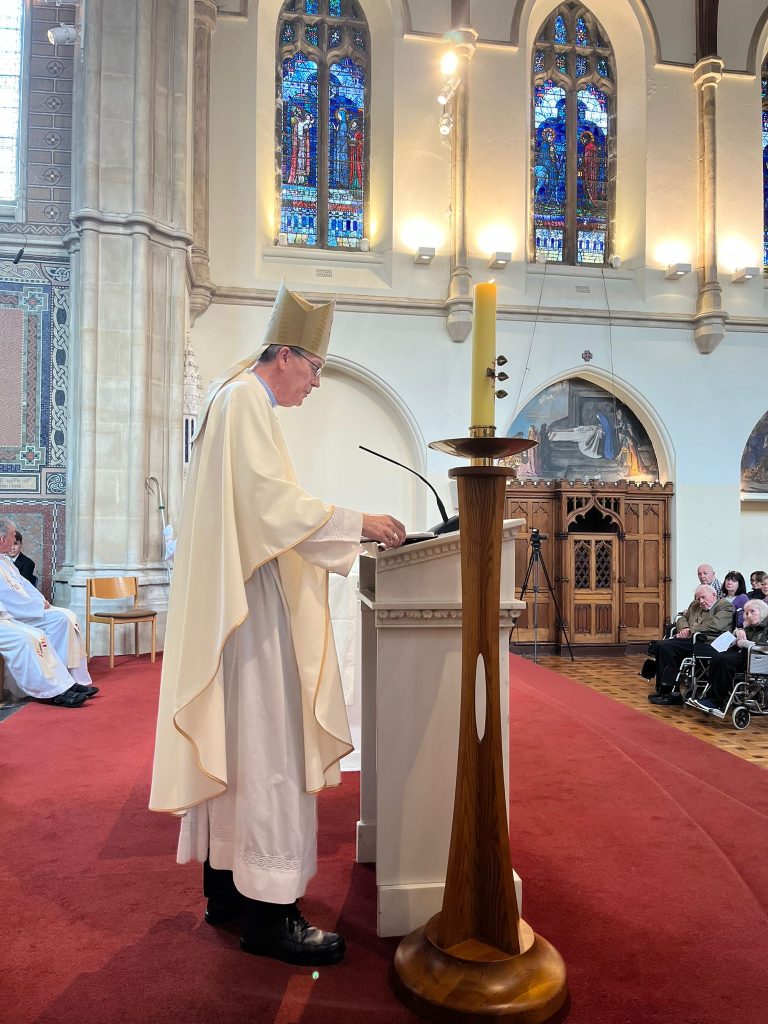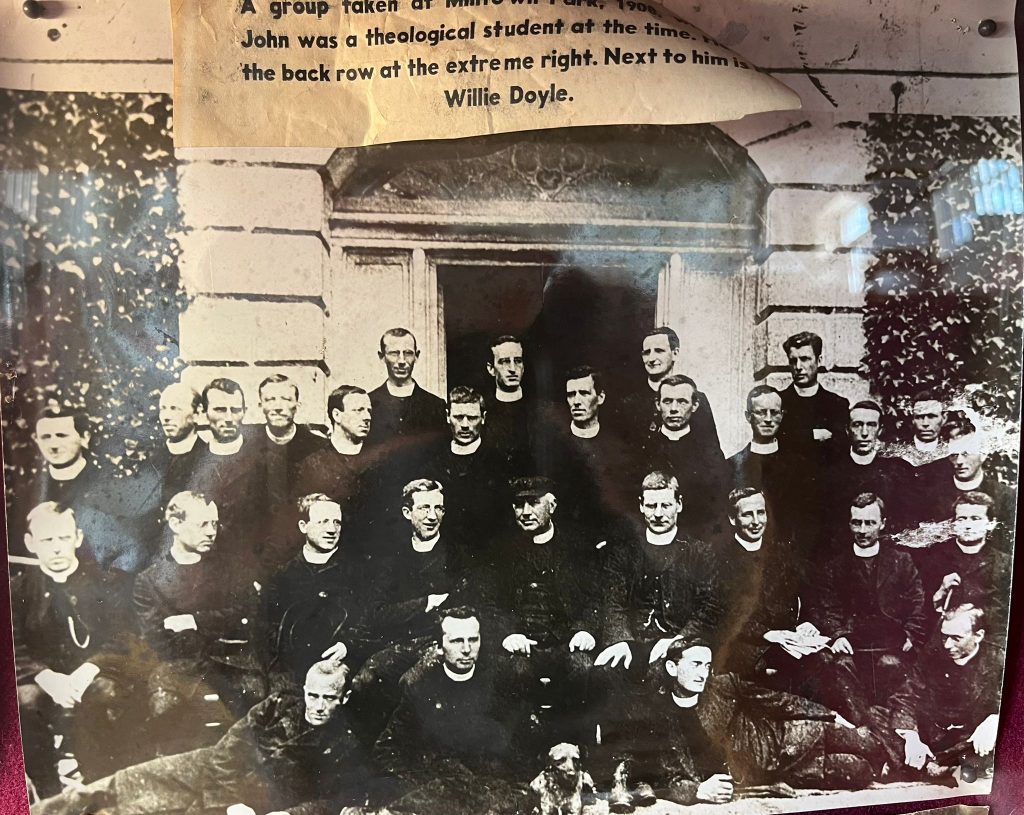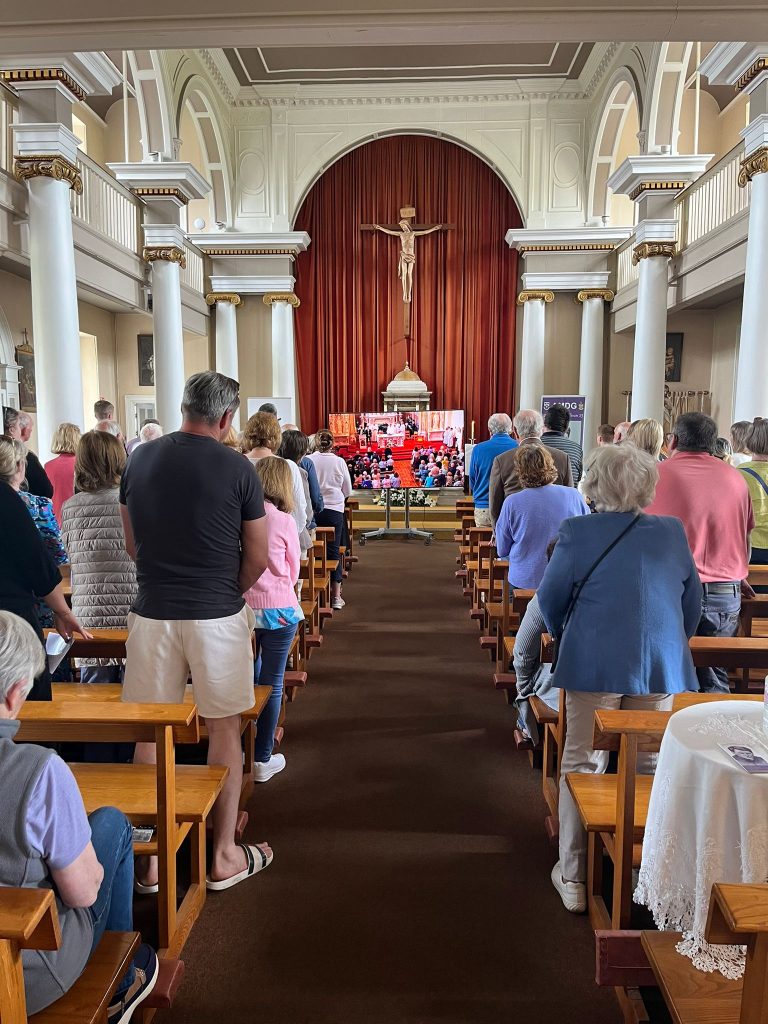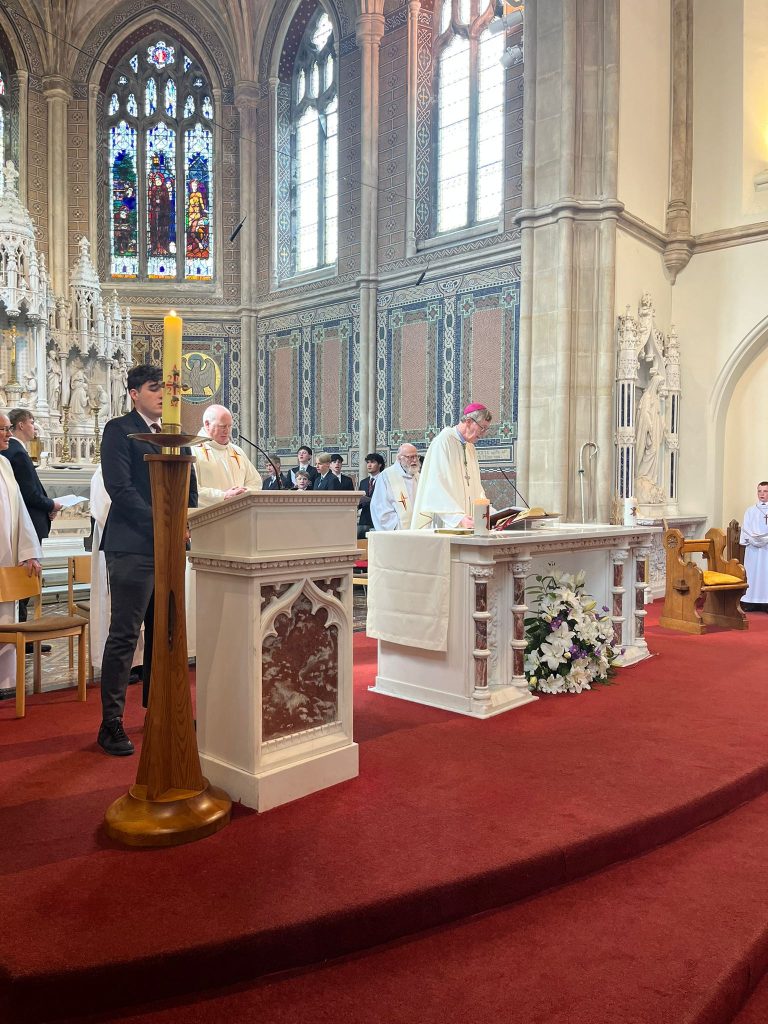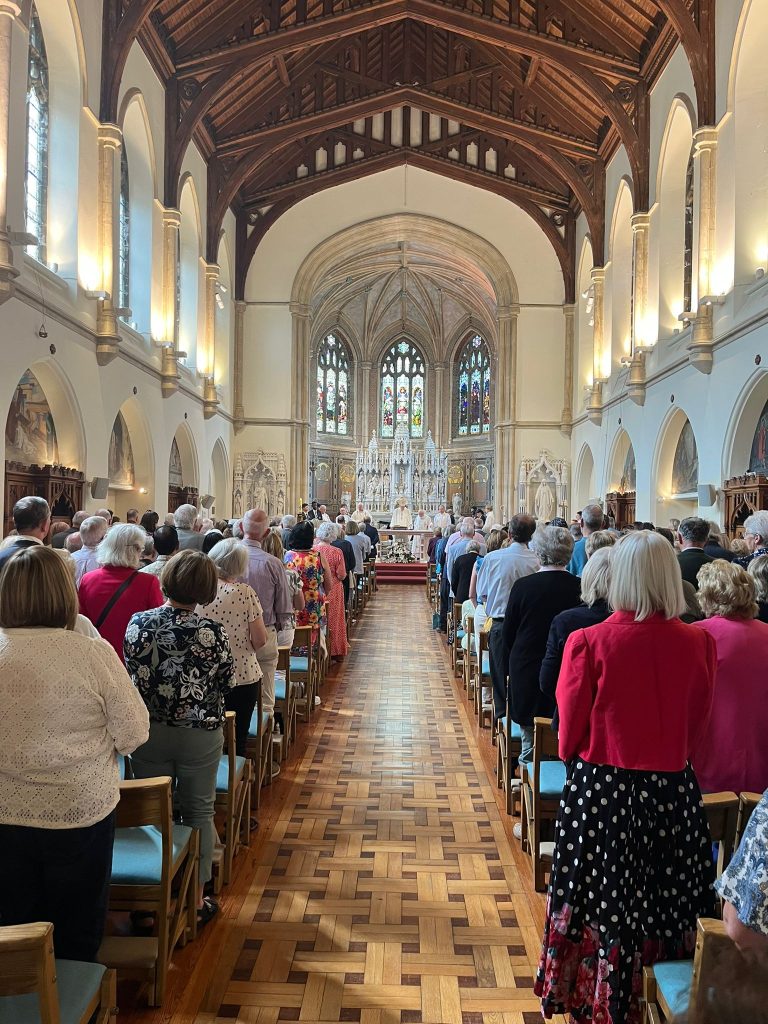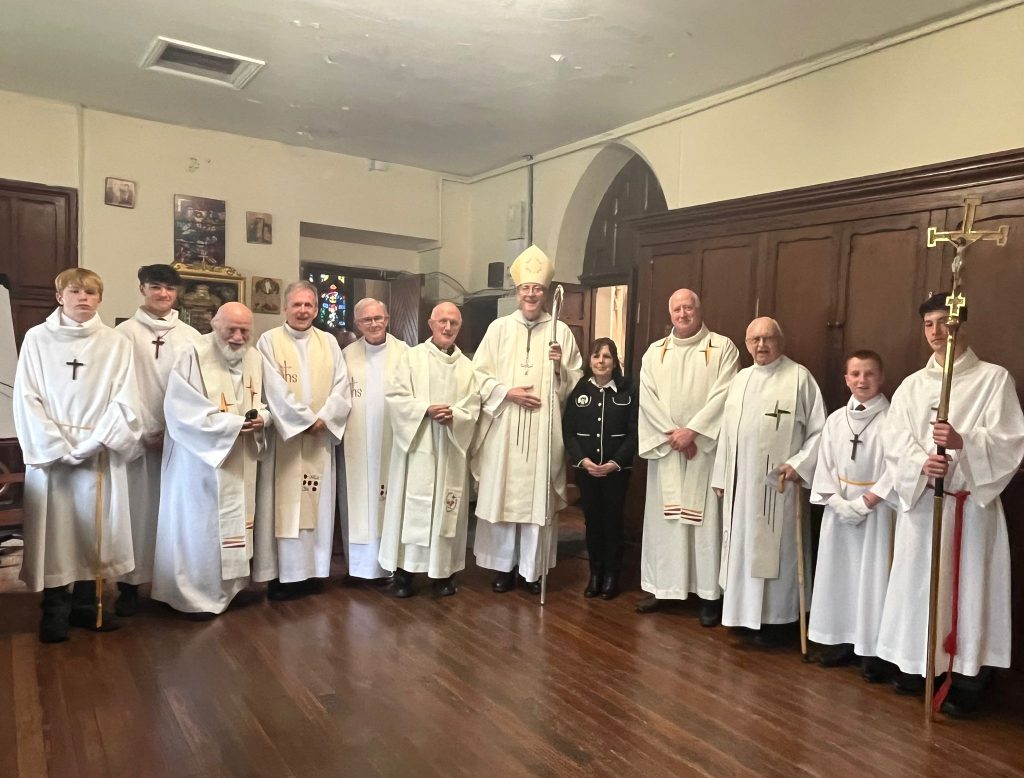Clongowes Wood College – 11.05.2025
Introduction:
The Fourth Sunday in our Easter journey is always ‘Day of Prayer for Vocations’. We have in the past restricted days like today to priestly vocations, religious vocations, essentially it’s about ministerial vocation, living out fully our baptismal calling, becoming co-responsible for our own faith and mission journey.
We honour today Blessed John Sullivan in this Annual Mass of Thanksgiving here in the splendid setting that is Clongowes Wood College. This Mass the one most closely associated with his date of birth – 08 May 1861. It’s the Mass where we say thanks for the many favours received through his intercession.
John’s gospel is brief, briefer than other texts around shepherding and tending to flocks. In all, it’s just four verses. But four verses that say everything about leadership, about calling, about ministry in a fast changing and furiously challenging church.
As we warmly welcome Pope Leo XIV, the late and much loved Pope Francis reminded us “God’s mercy … we are too poor to set conditions [on it]. We need to forgive because we need to be forgiven”[1] and so we pray:
- Is tusa Tobar na Trócaire – you are the wellspring of mercy: A Thiarna, déan trócaire
- Is tusa Slí na Fírinne – you are the way of Truth: A Chríost, déan trócaire
- Bí linn i gconaí, ós ár gcomhair amach – be with us always, showing us the way. A Thiarna, déan trócaire
Homily:
When it comes to farmyard animals, sheep don’t fare too well. They get a bad press. They can be led astray very easily. Many a sheep farmer here, will know the gap the sheep strayed through, by the evidence of wool everywhere. Sheep are not great at covering up their tracks, hiding their evidence!
They are in many ways vulnerable and their offspring, the younger lambs are particularly tender and weak. But sheep know the voice of their shepherd. And their ears are attuned to the arrival of the shepherd at any time. John’s gospel, in using the image of sheep for us, is describing the love of Jesus for each of us, holding us close to him, always near to His heart.
John Sullivan was born, as I mentioned on 08 May, 1861 at 41 Eccles Street, Dublin. For those not too familiar with the streets of Dublin, Eccles Street is where you find the Mater Hospital today. 41 Eccles Street might be one of those houses we call into when our GP sends us to meet a consultant, and our wallets are lighter on the way out.
John was reared in the Church of Ireland tradition, attending Portora Royal School, Enniskillen at the age of 12 in 1873, entering Trinity College in 1879, taking his degree in Classics in 1883. We have very little detail of the depth or degree of his faith over this time, except for a few anecdotes. One that comes to mind, Sullivan was chastised by one of the girls working in the college on the subject of going to church on Sundays. He told her he was tired of going to church, but if she would bring him to her church, he would go. Though somewhat bemused by this sudden fruit of her missionary endeavours, the young girl took him to Sunday Mass. We have no record of his impressions of that liturgy, but we do know around fifteen years later he would be received into the Catholic faith. None of us know the power of invitation and the grace of a response. The sheep indeed hear the voice of the shepherd.
The sudden death of his father in 1885, necessitated Sullivan changing career progression and pursuing legal studies in London, called to the English Bar in 1888. Details of his legal career in London are scant, how much did he practice as a barrister isn’t known. While in London, his interest in faith matters continued and he was received into the Catholic Church on 21 December, 1896 at Farm Street, London. His legal work in Ireland has records of him appearing in Irish courts at Cork, Limerick, Killarney, Carlow and Naas. While never a member of the Irish Bar, he acted as a registrar. I’ve mentioned before, on his visits to Carlow, he would serve Mass for the Poor Clare Sisters.
Pope Leo XIII was the Pope during the formative years of John Sullivan’s instruction and reception into the Catholic Church. He was in the papacy from 1878-1903. In 1900 John commenced novitiate in Rahan for the Jesuits, taking first vows two years later. While he was ordained at Milltown in 1907, I have no doubt the writing of Pope Leo XIII, his encyclical Rerum Novarum, on the rights and duties of capital and labour, protection of workers, vulnerable, like the sheep to exploitative employers would have been formative in the faith journey that John Sullivan took.
Blessed John Sullivan never got to Peru, the furthest he probably got to, was to Prosperous! And yet Pope Leo XIV was elected on the fourth ballot during the Papal Conclave and announced to the world on the birthday of Blessed John. Surely this is a good omen of things to come.
A word on vocations. In 1975 Robert Prevost, a twenty year old Chicago Math teacher, rejected Harvard Law to serve Peru’s poorest villages. He had everything a young man could dream of. He did what people would think crazy today, rejecting a life with a six-figure future to join a missionary group in Peru. To live among them, in their mountains, in their silence and in their poverty. He didn’t just live among them, he became one of them, learning Quechua, the sacred language of the Incas, carrying food on foot for days, sleeping on dirt floors with villagers. He taught math to barefoot children. He became their shepherd and now, since Thursday last, he is ours as Pope Leo XIV.
I recall the Mass we celebrated here in 2017, in the Sports Hall, honouring the beatification of Blessed John. As I met people afterwards, a lovely lady, bemoaned to me the fact that there were so few Jesuits going into formation. I suggested to her, why not encourage her son to become a priest. She replied, “oh not at all, he is going to study law”. That was the choice the young Robert Prevost didn’t make fifty years ago.
Another lady wrote to me after last year’s Clongowes Mass, with beautiful memories of her parents who knew Fr. John Sullivan in person as her dad would drive him often on his rounds. After exchanging the usual pleasantries, John always turned to prayer. The rosary beads came out of the pocket and the rest of the fifteen-twenty mile journey continued in prayer. We need to pray for vocations. And we need to actively encourage vocations.
While we are all acutely aware of the shortage of vocations, today, Day of Prayer for Vocations, is not only about priesthood or religious life, but all of us living the vocation that is our baptism. Pope Leo XIV in these early days of his pontificate, is inviting us to engage in a missionary key, but to do so within ourselves first, a call to live out our baptism. That final document of the Universal Synod reminded us “mission involves all the baptised”[2]. Whatever we do, whatever we are called to do, will not last, unless we take that journey inwards, where we will hear the shepherd’s voice and become one with the Father.
[1] Pope Francis, ‘I Want You to be Happy’, Hodder & Stoughton, 2025, pgs. 177-178
[2] XVI Ordinary General Assembly of the Synod of Bishops: Final Document, 26 October 2024, ¶66, pg. 22
